Is Feijoa Good for Pregnancy? Nurturing Life!
Feijoa is considered beneficial for pregnancy due to its rich nutritional profile. It provides key nutrients like vitamin C, fiber, folate, and antioxidants, which support the immune system, digestion, fetal development, and cellular health.
However, it’s crucial for pregnant women to consult with their healthcare provider before adding feijoa to their diet due to concerns such as blood sugar levels and potential allergies.
Feijoa, also known as pineapple guava, is a nutrient-dense fruit that can offer several health benefits during pregnancy:
It’s important to eat feijoa in moderation and after discussing with a healthcare professional, as individual health conditions can influence dietary choices during pregnancy.
Including feijoa in a prenatal diet can be advantageous for its nutritional benefits, but should be personalized based on health advice.

Key Takeaway
Nutritional Benefits of Feijoa During Pregnancy
| Nutrient | Benefit for Pregnancy | Amount per 100g of Feijoa |
|---|---|---|
| Vitamin C | Supports immune system and tissue repair | 32.9 mg |
| Fiber | Aids digestion and prevents constipation | 6.4 g |
| Folate | Essential for fetal development | 23 µg |
| Antioxidants | Protects against cellular damage | Varied (rich in flavonoids and phenolic compounds) |
Understanding Feijoa Nutrition

Feijoas contain an ample amount of essential nutrients beneficial for expectant mothers. This exotic fruit is packed with vitamin C, which is crucial for both the mother’s and the baby’s immune system, and for the absorption of iron—a mineral vital for preventing anemia during pregnancy.
Moreover, feijoas offer a good dose of fiber, aiding in digestion and reducing the common pregnancy discomfort of constipation.
Additionally, the presence of folate in feijoas is noteworthy. Folate is essential for fetal development and the prevention of neural tube defects.
The antioxidants in feijoas, such as vitamin E and flavonoids, support overall health, protecting cells from damage. It’s clear that feijoas can be a nutritious addition to a balanced prenatal diet.
Feijoa’s Vitamin Bounty
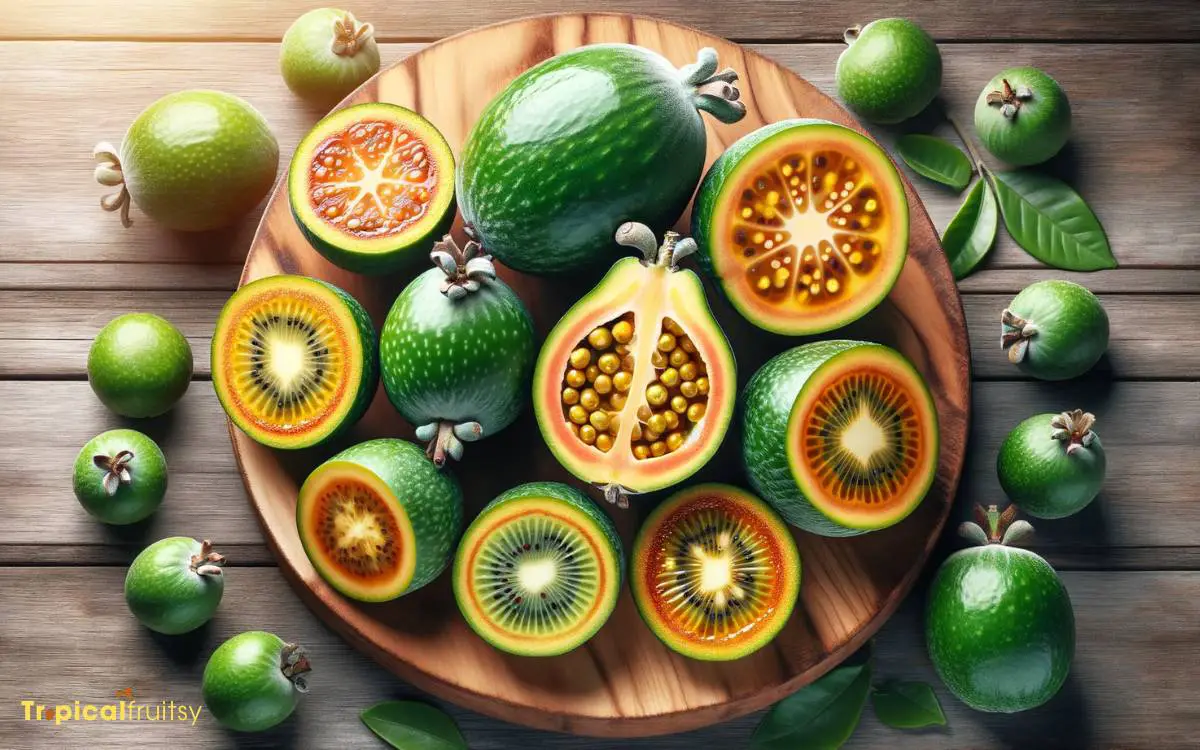
Diving into the vitamin-rich profile of feijoa, pregnant women will find a wealth of beneficial nutrients that cater to prenatal health needs.
Feijoa is particularly high in vitamin C, which is essential for the growth and repair of tissues, and it plays a critical role in the absorption of iron, a mineral vital for preventing anemia during pregnancy.
Additionally, feijoas contain vitamin B6, known to help with nausea and vomiting, common symptoms in early pregnancy.
To add depth and clarity, here’s a breakdown of key vitamins found in feijoas:
| Vitamin | Importance During Pregnancy |
|---|---|
| Vitamin C | Supports immune function and tissue repair |
| Vitamin B6 | Aids in reducing morning sickness |
| Folate | Crucial for fetal development and reducing neural tube defects |
This vitamin bounty underscores feijoa’s suitability as a nutritious choice for expectant mothers.
Fiber Content and Digestion

Feijoas are rich in dietary fiber, which is crucial for maintaining healthy digestion during pregnancy. The fruit’s fiber content helps prevent constipation, a common issue for expectant mothers.
Moreover, a diet high in fiber from feijoas supports overall digestive health, contributing to a more comfortable pregnancy.
Alleviates Constipation
A significant benefit of consuming feijoa during pregnancy is its high fiber content, which can help alleviate constipation, a common issue for expectant mothers.
Dietary fiber increases the weight and size of one’s stool and softens it, making it easier to pass and reducing the likelihood of constipation.
Feijoas can contribute to the daily fiber intake necessary to maintain healthy digestion during pregnancy.
| Benefit of Feijoa | Explanation |
|---|---|
| High Fiber Content | Helps form soft, bulky stool |
| Digestive Aid | Facilitates easier bowel movements |
| Nutrient-Rich | Provides vitamins and minerals alongside fiber |
Eating feijoas as part of a balanced diet can support digestive health, addressing one of the discomforts that often accompany pregnancy, and contribute to an overall nutritious intake.
Digestive Health Benefits
Because feijoas are rich in dietary fiber, they can significantly improve digestive health, which is particularly beneficial during pregnancy.
Adequate fiber intake is essential for preventing the common pregnancy discomfort of constipation. It works by helping to increase stool bulk and promote regular bowel movements, which are crucial for maintaining a healthy digestive tract.
Furthermore, the fiber in feijoas can aid in regulating blood sugar levels, which is important to avoid gestational diabetes, and may also contribute to a feeling of fullness, helping to manage weight gain during pregnancy.
This nutritious fruit, therefore, supports overall digestive wellness in expectant mothers. Moving beyond digestive health, it’s also worth noting that feijoas provide natural folate, an important nutrient for fetal development.
Natural Folate in Feijoa
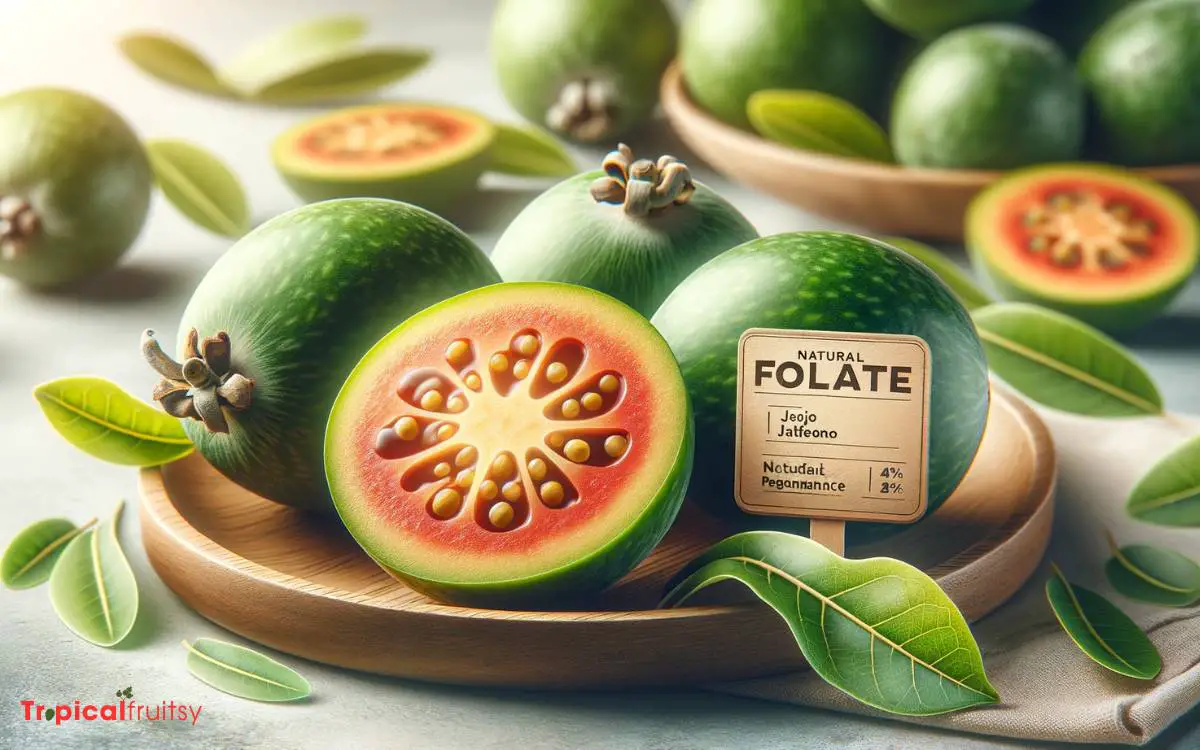
Feijoas are rich in natural folate, an essential nutrient that supports fetal development during pregnancy. Research contrasts the benefits of consuming natural folate in foods like feijoa with those of synthetic folic acid supplements.
Pregnant individuals must meet daily folate requirements to foster optimal health outcomes for both mother and child.
Fetal Development Support
Feijoa’s natural folate content is crucial for fetal development, supporting the rapid cell division and DNA synthesis required during pregnancy.
This essential nutrient plays a significant role in preventing neural tube defects and other developmental abnormalities.
Here’s how feijoa’s folate benefits the growing fetus:
- Promotes Neural Tube Formation: Adequate folate intake is vital for proper brain and spinal cord development in the early stages of pregnancy.
- Supports Placental Growth: Folate contributes to the growth and health of the placenta, which nourishes the fetus.
- Enhances Cell Creation: Folate is necessary for the production of new cells, including red blood cells.
- Reduces Anomaly Risks: Sufficient folate lowers the risk of certain birth defects, such as cleft lip and congenital heart defects.
Expectant mothers should consider feijoa as a natural and tasty source of this indispensable vitamin.
Folate Vs Synthetic Folic
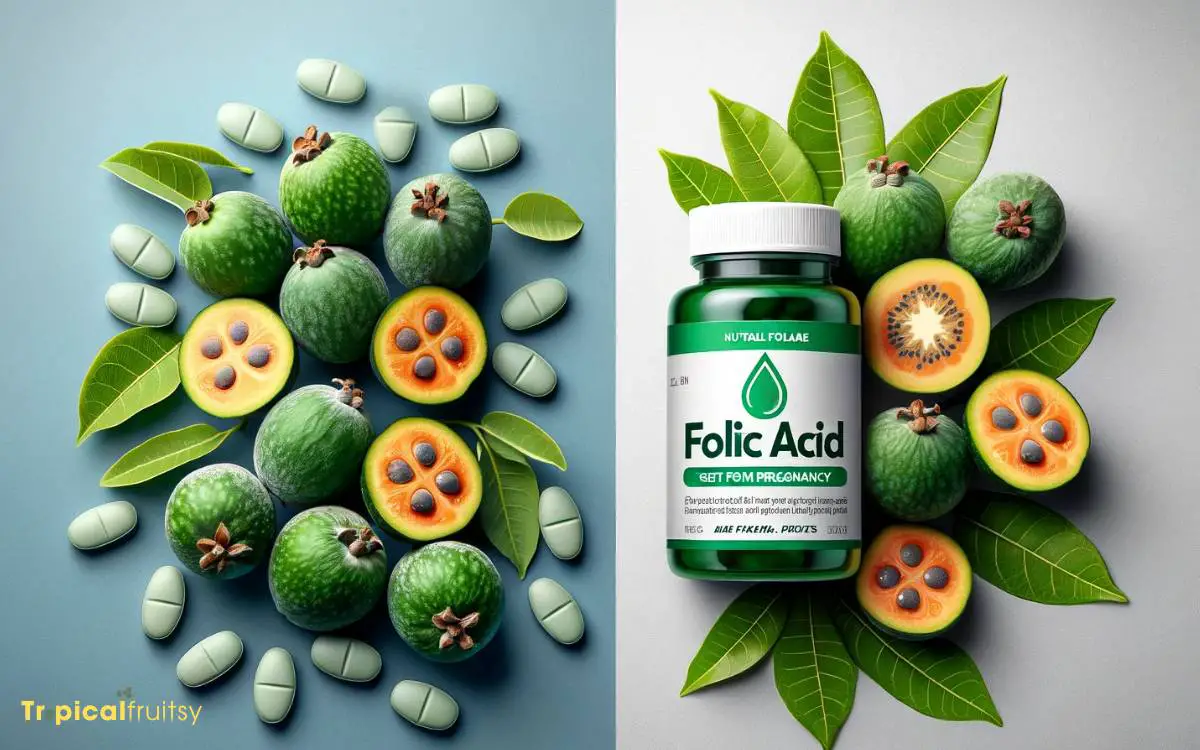
When comparing the two, it’s clear that the natural folate found in one feijoa offers distinct advantages over synthetic folic acid supplements commonly recommended during pregnancy.
Natural folate in feijoas is more readily bioavailable, meaning the body can utilize it more efficiently. This is critical for pregnant women who need folate to support fetal development and reduce the risk of neural tube defects.
| Aspect | Natural Folate (Feijoa) | Synthetic Folic Acid |
|---|---|---|
| Bioavailability | Higher | Lower |
| Metabolic Process | Direct Utilization | Requires Conversion |
| Risk of Masking B12 | Lower | Higher |
| Food Source | Whole Food | Fortified/Synthetic |
Natural folate’s direct utilization means there’s less risk of unmetabolized folic acid circulating in the blood, which can potentially mask vitamin B12 deficiency. Hence, feijoa’s natural folate is a valuable asset for expectant mothers.
Daily Folate Requirements
Understanding daily folate requirements is essential for understanding the benefits of incorporating feijoas into a balanced diet for expectant mothers.
It is important to note that a single feijoa can provide a significant portion of the recommended intake for pregnant women.
Folate is critical for fetal development and helps prevent neural tube defects, making it a crucial nutrient for pregnant women. Feijoa, being a natural source of folate, offers it in a form that is readily utilized by the body.
To further articulate the benefits of feijoa, consider the following points:
- The recommended daily intake of folate for pregnant women is 600 micrograms (mcg).
- A single feijoa contains approximately 23 mcg of natural folate.
- Consuming a variety of folate-rich foods ensures an adequate intake.
- Natural sources like feijoa may enhance folate absorption compared to synthetic forms.
Incorporating feijoas into a balanced diet can help expectant mothers meet their nutritional needs.
Antioxidant Properties Examined
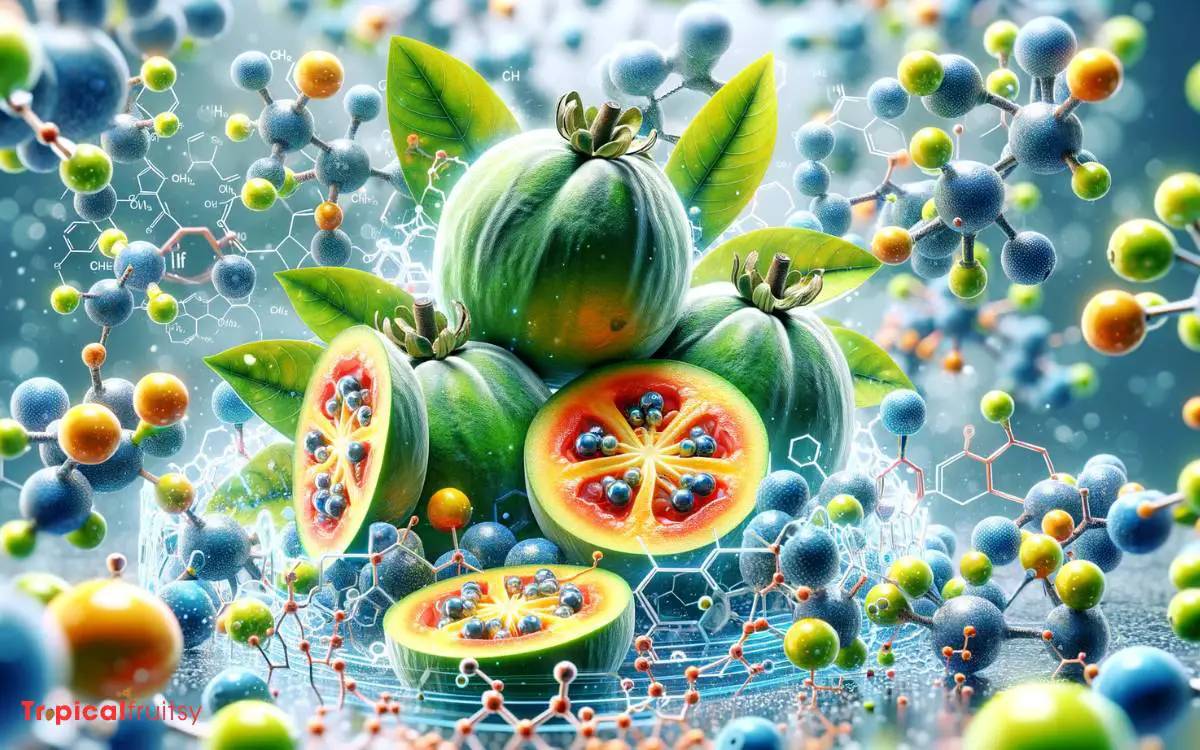
Examining the antioxidant properties of feijoa reveals that they’re potentially beneficial for pregnant women, as these compounds help combat oxidative stress linked to various pregnancy complications.
Antioxidants in feijoas, such as vitamin C and flavonoids, are crucial in neutralizing free radicals, which can cause cellular damage.
To make the information more relatable, here is a table highlighting key antioxidants in feijoa and their functions:
| Antioxidant | Function |
|---|---|
| Vitamin C | Protects cells, supports the immune system |
| Flavonoids | Reduces inflammation, enhances cell health |
This evidence-based insight underscores the importance of a diet rich in antioxidants for expecting mothers. Consuming fruits like feijoa can contribute to a healthier pregnancy by mitigating oxidative stress.
Managing Blood Sugar Levels
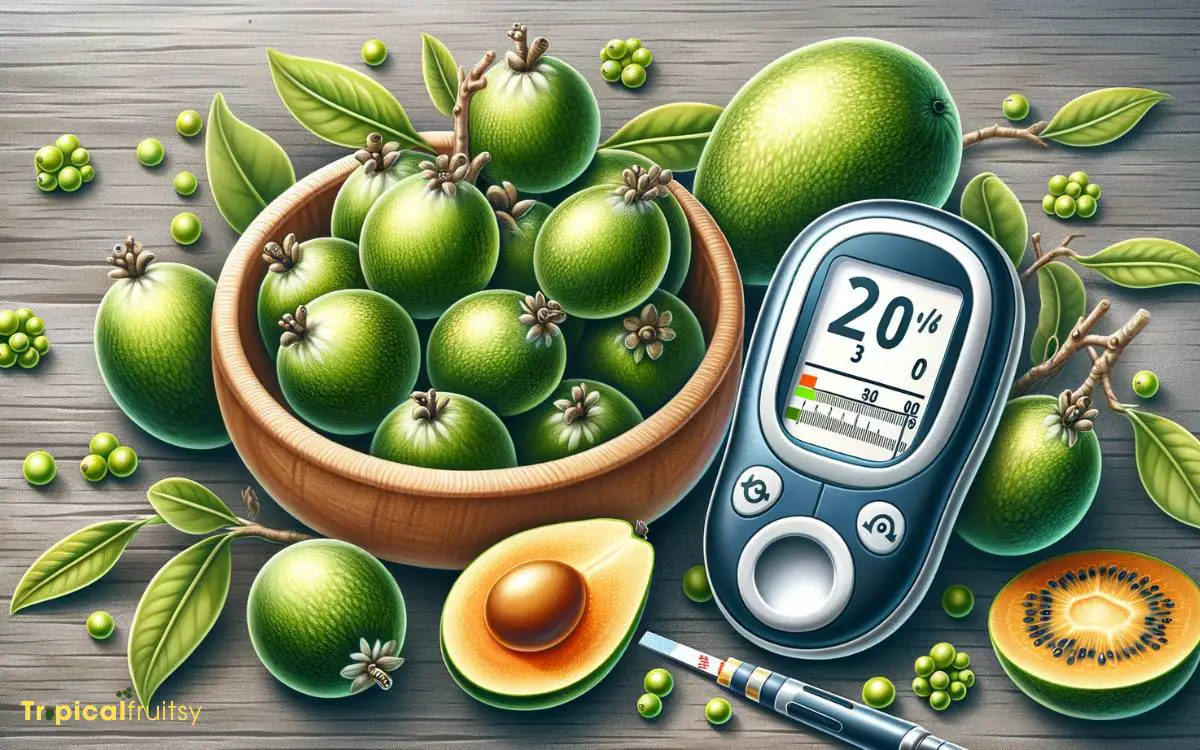
Beyond their antioxidant benefits, feijoas may also aid in managing blood sugar levels, an important consideration for pregnant women.
Maintaining stable blood sugar is crucial during pregnancy to prevent gestational diabetes, a condition that can affect both mother and baby’s health. Feijoas contain a good balance of fiber and natural sugars, which can help to prevent spikes in blood sugar.
Here’s how feijoas can be beneficial:
- Low Glycemic Index: Feijoas have a low glycemic index (GI), meaning they release sugars slowly into the bloodstream.
- Dietary Fiber: The fruit’s fiber content aids in slow sugar absorption.
- Vitamin C: Helps in the metabolization of glucose.
- Potassium: Balances electrolytes, which is essential for insulin function.
Consuming feijoas can be a part of a balanced diet to help manage blood sugar levels effectively during pregnancy.
Potential Allergies and Risks

While feijoas offer numerous health benefits for pregnant women, it’s important to consider potential allergies and risks associated with their consumption.
Allergic reactions to feijoas are rare, but they can occur, especially in individuals who are sensitive to other fruits or pollen. Symptoms may include itching, swelling, or difficulty breathing, which require immediate medical attention.
Pregnant women are advised to introduce feijoas into their diet gradually to monitor for any adverse reactions.
Additionally, due to the risk of pesticide exposure, it’s recommended to consume organic feijoas when possible. As with any dietary change during pregnancy, consulting with a healthcare provider is essential.
They can offer personalized advice, ensuring the safety of both the mother and the developing fetus.
Incorporating Feijoa Into Diet

A pregnant woman’s diet can benefit from the inclusion of feijoas, as these fruits are packed with essential nutrients that support fetal development.
To incorporate feijoas into a pregnancy diet effectively, consider the following methods:
- Fresh Out-of-Hand: Simply wash the fruit and enjoy it fresh for a quick, nutrient-rich snack.
- Smoothie Addition: Blend feijoas with other pregnancy-safe fruits and yogurt for a delicious, vitamin-packed smoothie.
- Baked Goods: Incorporate mashed feijoas into muffins or bread for a fiber-rich treat.
- Salad Topping: Add sliced feijoas to salads for a unique flavor and extra vitamin C boost.
Each method ensures that pregnant women can enjoy the full range of benefits from feijoas while adding variety to their meals.
Conclusion
Feijoa emerges as an unsung hero for expectant mothers, brimming with vital nutrients and natural folate. Its fiber-rich profile aids digestion, while its antioxidants fend off cellular stress.
However, one must tread carefully, considering potential allergies. As research unfolds, feijoa’s full impact on pregnancy remains a tantalizing mystery.
For now, incorporating this nutritious fruit into a balanced diet could be a small step with profound implications for maternal and fetal health.






